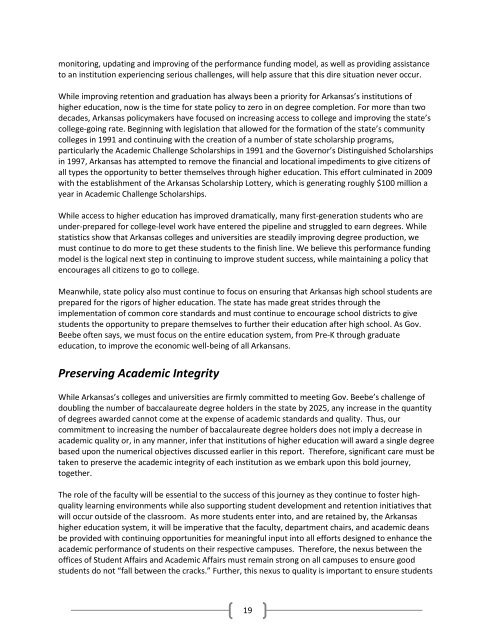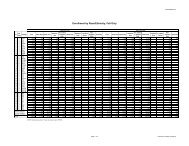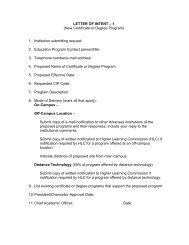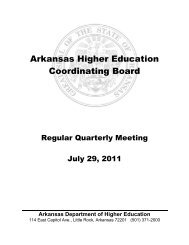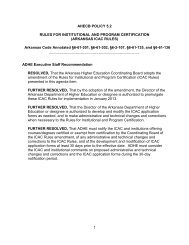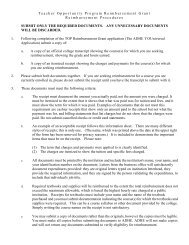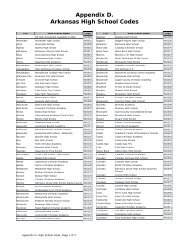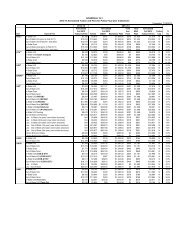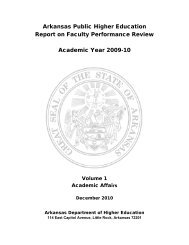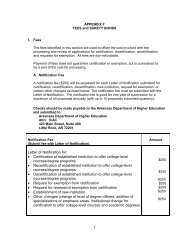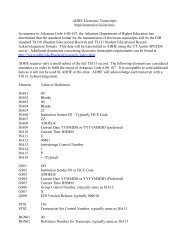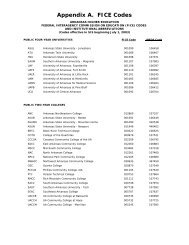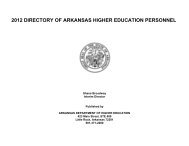ADHE Performance Funding System Report - Arkansas Department ...
ADHE Performance Funding System Report - Arkansas Department ...
ADHE Performance Funding System Report - Arkansas Department ...
Create successful ePaper yourself
Turn your PDF publications into a flip-book with our unique Google optimized e-Paper software.
monitoring, updating and improving of the performance funding model, as well as providing assistance<br />
to an institution experiencing serious challenges, will help assure that this dire situation never occur.<br />
While improving retention and graduation has always been a priority for <strong>Arkansas</strong>’s institutions of<br />
higher education, now is the time for state policy to zero in on degree completion. For more than two<br />
decades, <strong>Arkansas</strong> policymakers have focused on increasing access to college and improving the state’s<br />
college-going rate. Beginning with legislation that allowed for the formation of the state’s community<br />
colleges in 1991 and continuing with the creation of a number of state scholarship programs,<br />
particularly the Academic Challenge Scholarships in 1991 and the Governor’s Distinguished Scholarships<br />
in 1997, <strong>Arkansas</strong> has attempted to remove the financial and locational impediments to give citizens of<br />
all types the opportunity to better themselves through higher education. This effort culminated in 2009<br />
with the establishment of the <strong>Arkansas</strong> Scholarship Lottery, which is generating roughly $100 million a<br />
year in Academic Challenge Scholarships.<br />
While access to higher education has improved dramatically, many first-generation students who are<br />
under-prepared for college-level work have entered the pipeline and struggled to earn degrees. While<br />
statistics show that <strong>Arkansas</strong> colleges and universities are steadily improving degree production, we<br />
must continue to do more to get these students to the finish line. We believe this performance funding<br />
model is the logical next step in continuing to improve student success, while maintaining a policy that<br />
encourages all citizens to go to college.<br />
Meanwhile, state policy also must continue to focus on ensuring that <strong>Arkansas</strong> high school students are<br />
prepared for the rigors of higher education. The state has made great strides through the<br />
implementation of common core standards and must continue to encourage school districts to give<br />
students the opportunity to prepare themselves to further their education after high school. As Gov.<br />
Beebe often says, we must focus on the entire education system, from Pre-K through graduate<br />
education, to improve the economic well-being of all Arkansans.<br />
Preserving Academic Integrity<br />
While <strong>Arkansas</strong>’s colleges and universities are firmly committed to meeting Gov. Beebe’s challenge of<br />
doubling the number of baccalaureate degree holders in the state by 2025, any increase in the quantity<br />
of degrees awarded cannot come at the expense of academic standards and quality. Thus, our<br />
commitment to increasing the number of baccalaureate degree holders does not imply a decrease in<br />
academic quality or, in any manner, infer that institutions of higher education will award a single degree<br />
based upon the numerical objectives discussed earlier in this report. Therefore, significant care must be<br />
taken to preserve the academic integrity of each institution as we embark upon this bold journey,<br />
together.<br />
The role of the faculty will be essential to the success of this journey as they continue to foster highquality<br />
learning environments while also supporting student development and retention initiatives that<br />
will occur outside of the classroom. As more students enter into, and are retained by, the <strong>Arkansas</strong><br />
higher education system, it will be imperative that the faculty, department chairs, and academic deans<br />
be provided with continuing opportunities for meaningful input into all efforts designed to enhance the<br />
academic performance of students on their respective campuses. Therefore, the nexus between the<br />
offices of Student Affairs and Academic Affairs must remain strong on all campuses to ensure good<br />
students do not “fall between the cracks.” Further, this nexus to quality is important to ensure students<br />
19


